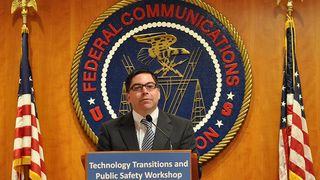O'Rielly: Best Response to 'Fake News' Is More Speech, Not Less

FCC commissioner Michael O'Rielly says he expects the FCC to be a "great partner" in the effort to ensure a free press—primarily by not intervening—and that the answer to fake news is more speech, not trying to selectively manicure the marketplace of ideas.
That came in a speech to the Media Institute in Washington, D.C., Thursday.
O'Rielly said the FCC has no role in regulating news content, and he would oppose giving it authority to do so, either by a "resurrected fairness doctrine or other 'seemingly innocuous' effort."
The fairness doctrine was an FCC rule that required broadcasters to actively air the other side of controversial issues.
Republicans feared, and with some reason, that Democrats would try to restore the doctrine as a way to combat conservative talk radio.
"[Y]ou can rest assured that news content is safe from any potential FCC filter in the name of the public interest," he said.
But while FCC chairman Ajit Pai has avoided weighing in on "fake news," O'Rielly, addressing an organization dedicated to preserving the First Amendment, weighed right in. He said one problem is that the term seemed to mean "whatever anyone wants it to mean." For some it is false reports cranked out by sketchy websites, he said, for others it seemed to be the "positive coverage of a certain presidential campaign," for others, he said, "it has been used to describe the viewpoint that major news media is not sufficiently examining all sides of an issue or covering all of the important issues of the day."
Broadcasting & Cable Newsletter
The smarter way to stay on top of broadcasting and cable industry. Sign up below
That last appeared to be a reference to President Trump's attacks on mainstream media. If so, others have described his branding of various mainstream news outlets as attacking the purveyors of stories critical of him.
The commissioner said it is important to establish what someone means when they start "handwringing about the problem of fake news." Particularly when they offer up "highly suspect solutions."
Those suspect solutions, he said, include internet content giants "retooling their search and news feed algorithms and even bringing on board thousands of 'fact checkers.'"
He suggests those will tend to "bury disfavored content" or promote other kinds of content in the name of protecting against fake news. He suggested that would not bode well for conservative speech, given that he said "the ground assumptions and the benefit of the doubt seem to lean exclusively in one ideological direction over others."
But he said it should concern legacy media outlets just as much because they could as easily find themselves on a losing end of a proprietary algorithm and never know it.
O'Rielly says the free market remedy, which he favors over edge provider algorithms or government intrusion, is to promote more speech, rather than trying to "perfectly manicure" the media environment by restricting it selectively.
"The First Amendment was meant to prevent the government from refereeing the rough and tumble media scene that we as Americans are so accustomed to seeing, hearing, or reading," he said. "The dandelions and ragweed are a feature, not a bug."
Contributing editor John Eggerton has been an editor and/or writer on media regulation, legislation and policy for over four decades, including covering the FCC, FTC, Congress, the major media trade associations, and the federal courts. In addition to Multichannel News and Broadcasting + Cable, his work has appeared in Radio World, TV Technology, TV Fax, This Week in Consumer Electronics, Variety and the Encyclopedia Britannica.

